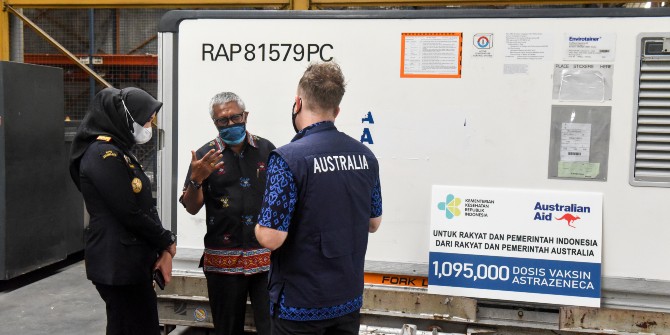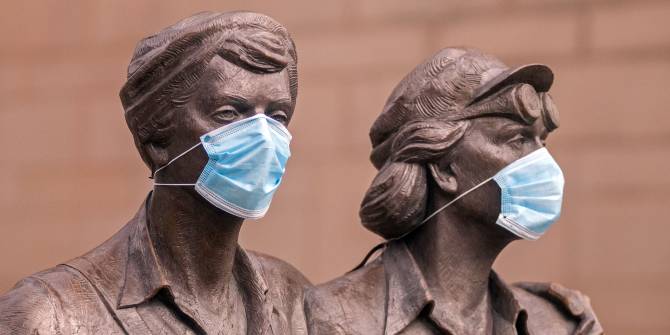The TRIPS waiver would allow countries in the Global South to manufacture their own mRNA COVID vaccines and distribute them more equitably, says Luke McDonagh (LSE). Contrary to suggestions by the representatives of pharma companies, it would not harm the economic model of pharmaceutical companies.
Omicron – a wake-up call on the consequences of vaccine inequity
During the COVID-19 pandemic we have often heard a moral refrain: nobody is safe until everybody is safe. Unfortunately, in practice this has proven untrue. With COVID, as with the climate emergency, we are all unsafe, but we are not equally unsafe. In the words of World Health Organisation (WHO) Director Dr Tedros Adhanom Ghebreyesus, gaps in access to vaccines created a two-tier pandemic defined by “vaccine apartheid” between rich and poor countries.
This inequity threatens to become a semi-permanent reality. The Economist Intelligence Unit reported that many low-income countries will not achieve the WHO goal of 70% vaccination by 2023, and ‘possibly never’. This point was echoed by Moderna’s third quarter (Q3) 2021 financial report, which stated that even if the situation becomes endemic in high-income (OECD) countries by mid-2022 – due to abundance of vaccines and treatments – low and middle-income countries in the global south will remain in a pandemic scenario into 2023 and beyond.
On top of this, we now face Omicron. In the rich states of the global north, Omicron has led to an increased need for third and fourth doses (as boosters for adults) and for further doses to vaccinate children. This means that the global south now faces a huge shortfall of 3bn vaccine doses in early 2022. Alas, even this assessment may be too optimistic.
Omicron could present an extraordinarily daunting problem for the global south. The new COVID-19 variant appears to evade substantially the protection offered by most of the older-style inactivated virus or viral vector vaccines already administered in low- and middle-income countries during 2021: the Chinese-made (Sinovac) and Russian-made (Sputnik V) vaccines, as well as the Oxford-AstraZeneca and Johnson & Johnson jabs. By contrast, the continued protection offered by the mRNA vaccines produced by Moderna and Pfizer-BioNTech – which have primarily been administered in rich countries – is much higher.
Put simply, if we want to end the pandemic, we must end it everywhere – and the best way of doing that is to massively increase production of the most effective type of vaccine: mRNA. Thus far, however, Moderna and Pfizer-BioNTech have refused to engage with voluntary schemes for knowledge-sharing put forward by the WHO, such as the mRNA hub in South Africa. Crucially, unlike AstraZeneca, which has transferred technology in full to Serum Institute (India) and Fiocruz (Brazil) for generic production, Moderna and Pfizer-BioNTech have not transferred the mRNA tech in full to any global south producers. Pfizer-BioNTech have only agreed (since July 2021) two limited ‘fill and finish’ deals, with Biovac in South Africa and Eurofarma Laboratorios in Brazil, which will see these companies finishing and bottling the vaccines provided in bulk by Pfizer-BioNTech during 2022. Given the scale of the challenge the world faces with Omicron, these limited deals are nowhere near enough.
Since intellectual property rules appear to be enabling protectionism by Moderna and Pfizer, and hindering generic production, the case for temporarily waiving IP rights becomes compelling
Boosting production of mRNA vaccines in the global south is feasible. The New York Times recently reported that there is substantial productive capacity in countries like India, South Africa and Brazil that continues to be under-utilised. A new report by Human Rights Watch indicates that there may be up to 100 sites around the world that could be scaled up for mRNA manufacturing.
We must remember that the principal way that developing countries emerged from the HIV/AIDS epidemic was through the facilitation of generic drug production in global south countries like India and South Africa. Ideally, in the COVID vaccine context Moderna and Pfizer-BioNTech would agree to share know-how to speed up generic production. But in the absence of this, other options must be explored. Since intellectual property (IP) rules appear to be enabling protectionism by Moderna and Pfizer, and hindering generic production, the case for temporarily waiving IP rights thus becomes compelling.
What is the TRIPS waiver? What would it do?
The WTO TRIPS (Trade-Related Aspects of Intellectual Property Rights) waiver is not a new proposal – it dates from October 2020. When it was first raised in the Autumn of 2020, vaccine trial data was still being analysed, and no vaccines had yet been administered. Yet, even at that early stage, the global south had the foresight to know they would be left behind in the distribution of jabs. And so it has proved: countries with a low vaccination rate have in effect become incubators for new variants, including Omicron.
The TRIPS proposal seeks to waive temporarily international IP rules over COVID technologies for a limited period (the duration of the pandemic). The impulse behind the initiative was to bring about the generic production of vaccines, COVID treatments and diagnostics in the global south, particularly in major regional hubs in India, South Africa and Brazil. Thus, the waiver is not an end in itself, but a way of achieving the production of generic COVID mRNA vaccines in a situation where neither Moderna nor Pfizer are willing to do sufficient voluntary tech-transfer deals.
The representatives of pharmaceutical companies have exaggerated the effect a TRIPS waiver would have, claiming that it would obliterate their economic model or in some way abolish IP rights. That is not true. It is a waiver of international obligations, which does not affect national intellectual property (IP) rights. What it would do is to free up individual national jurisdictions to decide what their domestic IP policy should be during the pandemic. The TRIPS waiver would primarily be used by relatively low- and middle-income countries to change their national laws (as Brazil is attempting to do) to facilitate generic production.
Sharing the knowledge makes sense given the huge public funding of vaccine development
While some minor legal changes might be required for countries in the global north, perhaps to facilitate the sharing of know-how and authorisation data from agencies such as the US FDA with e.g. the mRNA hub in South Africa, it is very unlikely that the waiver would require any wholesale changes to US, UK or European patent law. Indeed, the US may not need to change any statutes – Amy Kapczynski argues that the US already has authority under the Defense Protection Act to share knowledge with bodies like the WHO mRNA hub in South Africa. The US government has a huge amount of information on the Moderna vaccine because a government agency – the National Institutes of Health – was a co-inventor of it. The TRIPS waiver would provide international legal and diplomatic cover for countries such as the US to share as much knowledge as possible with global south regulators and producers. Sharing the knowledge makes sense given the huge public funding of vaccine development. Moderna received $10 billion from the US government, including almost $2 billion in development funds with a further $8 billion in procurement. BioNTech received more than 400 million euros from the German government to develop the vaccine.

It is also possible that trade secrets and knowhow on the mRNA technology may ‘leak’. Part of the Pfizer-BioNTech recipe ended up in a contract that was made available online, and was subsequently published by the US NGO Public Citizen. Recently Pfizer accused one of its own employees of trade secret violation after they uploaded a huge amount of data relating to vaccine production processes to a Google document. The TRIPS waiver would allow a global south country like South Africa to make use of any leaked trade secrets related to the mRNA production process.
The mRNA vaccines are the best candidates for manufacturing of generic vaccines
At the same time, rich states such as the US and EU countries can continue to purchase doses from Moderna and Pfizer-BioNTech as they are doing now, which would maintain very high levels of revenue. A lesson of the success of HIV-AIDS generic production is that the high-income and low-income markets for medicines can and do operate separately. There are many ways rich states can block generic imports from affecting the high-income market, including through customs and import procedures, or via refusal to give marketing authorisation. This is true in the COVID-19 instance as well: in recent weeks Merck and Pfizer have granted two licences to the UN Medicines Patent Pool for COVID-19 pills (but not vaccines). Even though Pfizer is licensing generic production of Paxlovid to several global south countries, Pfizer still expects to make $15-25 billion from sales to rich countries. So, the idea that generic production in the global south will destroy the incentives and economic model of pharmaceutical companies is simply untenable.
It is not too late for the EU and UK to support a TRIPS waiver
The goal of the waiver is actually a modest one. It is to make it possible for global south states to utilise a different IP policy than the TRIPS norm – one that better suits this particular emergency. The mRNA vaccines are the best candidates for manufacturing of generic vaccines. They are the quickest to produce, the closest to small-scale drug production, and they are very effective. A WTO TRIPS waiver is supported by more than 100 countries including the US and China. The EU and UK are the main opponents. Rather than simply restating the current TRIPS rules, the EU and UK should agree to negotiate openly and transparently over the India/South Africa text, towards agreement on a waiver text at the WTO in early 2022.
This post represents the views of the author and not those of the COVID-19 blog, nor LSE.





